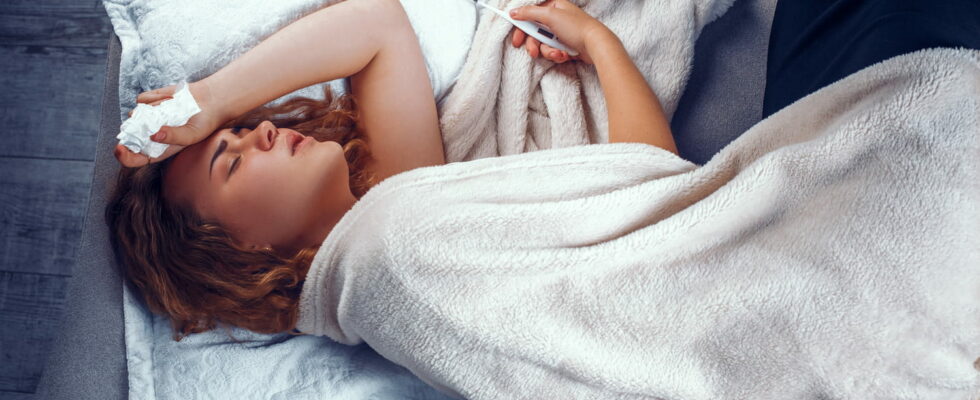It’s hard to sleep well when you have a cold, cough and runny nose. Here are our sleep doctor’s tips for breathing well and having a restful night.
It seems that sleep is the best medicine when you are sick! Yes, provided you manage to sleep (well). Nose washing, room temperature, ideal dinner… Here are the tips of Dr. Marc Rey, sleep doctor, for sleeping well when you have a cold.
► Clean your nose with a seawater spray or with physiological saline, if you have nasal congestion due to a cold, this will help unclog the nasal passages and unclog the nose.
► Blow your nose before sleeping, in a way slow and prolonged so as not to damage the nasal septum.
► Sleep in an inclined position rather than lying down: “This allows torelieve pressure on the sinusesto facilitate the passage of air and to clear the respiratory tract“. In practice, we raise his head, in order to be in a slightly more seated position, with the bust slightly straightened. For this, it is necessary touse an extra pillowespecially if you have congested airways.
► Use a cool mist humidifier or failing that, a bowl of water placed on the radiator to humidify the air. Inhaling a few drops ofEucalyptus radiata essential oil in a bowl of hot water helps to decongest and unclog the nose. Attention, this HE is contraindicated to pregnant women under 3 months, children under 7 and people with asthma and epilepsy.
“The fact of drink water throughout of the day helps prevent drying of the mucous membranes of the nose. In general, good hydration also makes it possible to thin secretions (the mucus present in the nose), to help them flow more easily.“, advises our interlocutor.
“Good sleep preserves our immune system and helps to better resist infections. On the other hand, a sleep debt weakens it, which promotes bacterial or viral contamination”
A stuffy nose at night promotes snoring and dries up the throat, what makes you cough. The main culprit: too dry air, which dries out the mucous membranes of the nose and pharynx and which promotes coughing fits, unpleasant, firstly for oneself and secondly for the person with whom one sleeps. To humidify the air, use a cool mist air humidifier – because hot steam models tend to overheat the room – or a bowl of boiling water near the radiator. Moreover, Drinking water helps calm coughing fits. It is advisable to have a bottle of water handy overnight. Also, sleeping with head elevated (without sleeping seated) helps clear the bronchi. We can for example stack two pillows. Finally, consider the spoonful of honey in an infusion or hot milk, just before sleeping. Honey has softening, healing and restorative properties – thanks to its antioxidants and the sugar it contains – and helps to calm night coughs, especially dry coughs.
What temperature to sleep well with a cold?
The ideal temperature for sleeping should be lower around 18°C-19°C. “If it’s too hot, you’ll sweat and get even colder. But it also promotes the proliferation of microbes!“, he continues. It is better to wear thick pajamas in natural material, cotton or silk, rather than polyester which also promotes perspiration. Also, the fact ofventilate your room eliminates microbes and prevents their proliferation. It is therefore advisable to renew and purify the air of the room in which we sleep daily. For that, we open the windows 10 minutes a day summer and winter, ideally 5 minutes in the morning and 5 minutes in the eveningat a time when there is less traffic.
What to eat for a cold?
When we are sick, we especially need stock up on vitamins and mineralsand we must absolutely continue to eat (even if we are not hungry) so we can bet on a light dinner two hours before bedtime, with :
- A vegetable soup that will warm and provide the perfect nutrients for the immune system
- A portion of slow carbohydrates (a little rice, a little vermicelli in a soup or in a broth, a slice of wholemeal bread)
- A serving of lean protein such as a slice of turkey breast, a slice of ham, or an egg
- A low-fat dairy product such as yogurt or cheese such as Carré frais©
- A fruit or compote.
What to drink before going to bed?
As for drinks, alcohol is obviously to be avoided (so we forget the rum-based grog or else we realize a non-alcoholic toddy with lemon (anti-infectives), cloves (anti-inflammatories), cinnamon (antibacterial) and Honey (antiseptic)). Similarly, we avoid drinking tea or coffee which are exciting. It is recommended to drink thyme herbal teaa plant known to purify the body, reduce inflammation and calm coughs, based on rosemaryknown to decongest the airways, or based on lavender which has expectorant properties and strengthens the immune system. You can add to this infusion a spoonful of thyme honeyantibacterial and anti-inflammatory.
Thanks to Dr. Marc Rey, neurologist, sleep specialist and President of the National Institute of Sleep and Vigilance (InVS).
